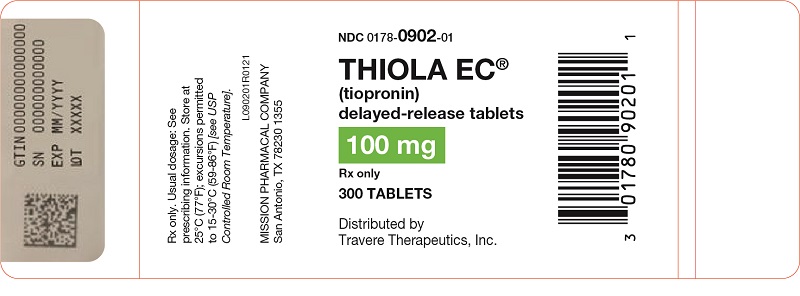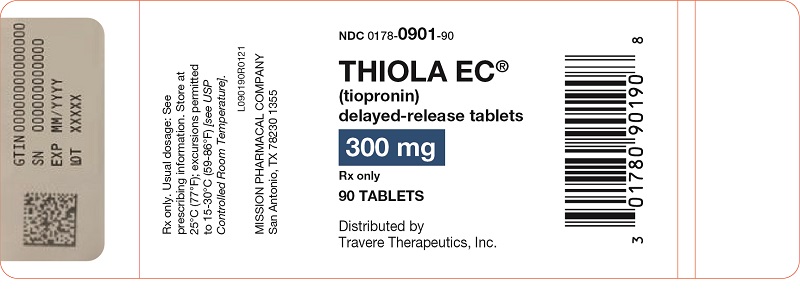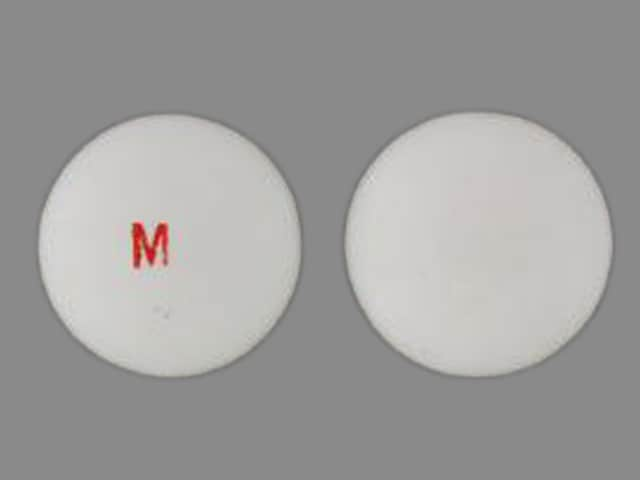Thiola
Generic name: tiopronin
Brand names: Thiola, Thiola EC
Drug class: Miscellaneous genitourinary tract agents
Medically reviewed by A Ras MD.
What is Thiola used for?
Thiola is a prescription medicine that is used to prevent kidney stones.
Description
THIOLA EC (tiopronin) delayed-release tablets are a reducing and cystine-binding thiol drug (CBTD) for oral use. Tiopronin is N‑(2‑Mercaptopropionyl) glycine and has the following structure:

Tiopronin has the empirical formula C5H9NO3S and a molecular weight of 163.20. In this drug product tiopronin exists as a dl racemic mixture.
Tiopronin is a white crystalline powder, which is freely soluble in water.
Each THIOLA EC tablet contains 100 or 300 mg of tiopronin. The inactive ingredients in THIOLA EC tablets include lactose monohydrate, hydroxypropyl cellulose, hydroxypropyl cellulose (low substitute), magnesium stearate, hydroxypropyl methylcellulose E5, methacrylic acid: ethyl acrylate copolymer (Eudragit L 100-55), talc, triethyl citrate.
Mechanism of Action
The goal of therapy is to reduce urinary cystine concentration below its solubility limit. Tiopronin is an active reducing agent which undergoes thiol-disulfide exchange with cystine to form a mixed disulfide of tiopronin-cysteine. From this reaction, a water-soluble mixed disulfide is formed and the amount of sparingly soluble cystine is reduced.
Before taking Thiola, tell your doctor:
- If you are allergic to Thiola; any part of this medicine; or any other drugs, foods, or substances. Tell your doctor about the allergy and what signs you had.
- If you are breast-feeding. Do not breast-feed while you take Thiola.
This medicine may interact with other drugs or health problems.
Tell your doctor and pharmacist about all of your drugs (prescription or OTC, natural products, vitamins) and health problems. You must check to make sure that it is safe for you to take Thiola with all of your drugs and health problems. Do not start, stop, or change the dose of any drug without checking with your doctor.
What are some things I need to know or do while I take Thiola?
- Tell all of your health care providers that you take Thiola. This includes your doctors, nurses, pharmacists, and dentists.
- Have blood work checked as you have been told by the doctor. Talk with the doctor.
- Have your urine checked as you have been told by your doctor.
- You may need to avoid drinking alcohol with some products. Talk with your doctor or pharmacist to see if you need to avoid drinking alcohol with Thiola.
- Tell your doctor if you are pregnant or plan on getting pregnant. You will need to talk about the benefits and risks of using Thiola while you are pregnant.
How is Thiola best taken?
Use Thiola as ordered by your doctor. Read all information given to you. Follow all instructions closely.
- Take on an empty stomach at least 1 hour before or 2 hours after meals unless your doctor has told you otherwise.
- Take Thiola at the same time of day.
- Follow the diet plan that your doctor told you about.
- Follow what your doctor has told you about the type of liquids to drink and how much liquid to drink while you take Thiola.
What do I do if I miss a dose?
- Take a missed dose as soon as you think about it.
- If it is close to the time for your next dose, skip the missed dose and go back to your normal time.
- Do not take 2 doses at the same time or extra doses.
What are the side effects of Thiola that I need to call my doctor about immediately?
WARNING/CAUTION: Even though it may be rare, some people may have very bad and sometimes deadly side effects when taking a drug. Tell your doctor or get medical help right away if you have any of the following signs or symptoms that may be related to a very bad side effect:
- Signs of an allergic reaction, like rash; hives; itching; red, swollen, blistered, or peeling skin with or without fever; wheezing; tightness in the chest or throat; trouble breathing, swallowing, or talking; unusual hoarseness; or swelling of the mouth, face, lips, tongue, or throat.
- Signs of kidney problems like unable to pass urine, change in how much urine is passed, blood in the urine, or a big weight gain.
- Fever.
- Feeling very tired or weak.
- Joint pain.
- Swollen gland.
- Any skin change.
- Swelling in the arms or legs.
- Chest pain.
- Not able to get or keep an erection.
What are some other side effects of Thiola?
All drugs may cause side effects. However, many people have no side effects or only have minor side effects. Call your doctor or get medical help if any of these side effects or any other side effects bother you or do not go away:
- Upset stomach or throwing up.
- Change in taste.
- Not hungry.
- Stomach pain or diarrhea.
- Mouth sores.
- Cough.
- Itching.
- Feeling tired or weak.
These are not all of the side effects that may occur. If you have questions about side effects, call your doctor. Call your doctor for medical advice about side effects.
You may report side effects to the FDA at 1-800-332-1088. You may also report side effects at https://www.fda.gov/medwatch.
If overdose is suspected:
If you think there has been an overdose, call your poison control center or get medical care right away. Be ready to tell or show what was taken, how much, and when it happened.
How do I store and/or throw out Thiola?
- Store at room temperature.
- Store in a dry place. Do not store in a bathroom.
- Keep all drugs in a safe place. Keep all drugs out of the reach of children and pets.
- Throw away unused or expired drugs. Do not flush down a toilet or pour down a drain unless you are told to do so. Check with your pharmacist if you have questions about the best way to throw out drugs. There may be drug take-back programs in your area.
Label
PRINCIPAL DISPLAY PANEL



